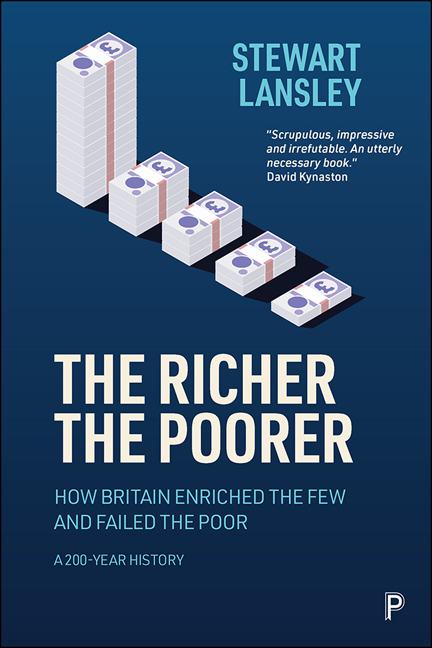Book contents
- Frontmatter
- Miscellaneous Frontmatter
- Dedication
- Epigraph
- Contents
- List of figures
- Preface and acknowledgements
- Introduction: Knighthoods for the rich, penalties for the poor
- PART I 1800–1939
- PART II 1940–59
- PART III 1960–79
- PART IV 1980–96
- PART V 1997–2010
- PART VI 2011–20
- Afterword: COVID-19 and ‘the polo season’
- Notes
- Index
27 - Breaking the high-inequality, high-poverty cycle
Published online by Cambridge University Press: 13 May 2022
- Frontmatter
- Miscellaneous Frontmatter
- Dedication
- Epigraph
- Contents
- List of figures
- Preface and acknowledgements
- Introduction: Knighthoods for the rich, penalties for the poor
- PART I 1800–1939
- PART II 1940–59
- PART III 1960–79
- PART IV 1980–96
- PART V 1997–2010
- PART VI 2011–20
- Afterword: COVID-19 and ‘the polo season’
- Notes
- Index
Summary
For most of the last two hundred years, Britain has been a high-poverty, high-inequality nation. With the exception of the immediate post-war era, the struggles for share have been won by the richest and most affluent sections of society. In 2020 there were few signs that this norm was about to be broken.
Measured simply in absolute terms, capitalism's dynamism, along with state-supported innovation, the expansion of public services and social pressure, has brought remarkable progress, more fulfilling lives, better health and longer life spans. Conservative thinkers have used this progress to claim that poverty in wealthy countries has been banished. For Deirdre McCloskey, for example, once people have ‘a roof over their heads and enough to eat, and the opportunity to read and vote and get equal treatment by the police and courts’, their needs have been sufficiently met. On this basis, it is not a requirement that the poorest should share fully in rising national income.
While the past is an essential reference point, there is a fatal flaw in the notion of the most basic of past standards as the key measure of social advance. Should, for example, progress be judged today on the basis of Rowntree's 1950 line, or even his 1936 line, rather than the updated versions by contemporary researchers? On past standards, poverty in Britain has been almost, but far from fully eliminated. But is it acceptable to adopt a contemporary minimum based on an ancient benchmark? And what are the implications of such an approach for policy? The adoption of a pure absolute line, as many still advocate, suggests that benefit levels should be held in a time warp, raised only enough to compensate for inflation. This happened through the 1980s, while working-age benefit levels were lowered in real terms from 2010. Absolute measures of progress imply that sections of society have no right to share in social and economic advance.
Material progress is also a partial measure of advance, while social progress has rarely followed a conventional linear theory of history. The idea of continuous upward progress may be true for some, but for many it has been a much more mixed picture.
- Type
- Chapter
- Information
- The Richer, the PoorerHow Britain Enriched the Few and Failed the Poor: A 200-Year History, pp. 239 - 247Publisher: Bristol University PressPrint publication year: 2021



